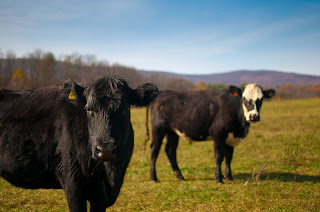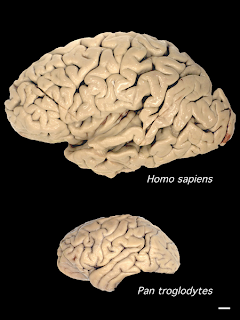I ate a steak yesterday. Thanks to Patricia McConnell’s class on human and animal behavior and ethics and Hal Herzog’s Some We Love, Some We Hate, Some We Eat the experience troubled me greatly.
I come from a family of meat eaters, yet have dabbled with vegetarianism before. I was around 15 and I stopped after three months because didn’t have the time between school and extra curricular activities to educate myself about nutrition and what my body needed, therefore was not doing it right. Though some college students might disagree, one cannot subsist on Ramen Noodles alone. So I went back to eating the same meals as my family, and thus eating meat.
 |
| Beef cattle. Source: Wikimedia Commons |
When I came home for the summer last week, I was more than happy to expound upon my new found interest in animal ethics and why we should or should not eat meat. One of the first things my brother said to me was “Oh God you aren’t going to start with the vegetarian thing again are you?” While the answer is no, I don’t have any immediate plans to give up eating meat all together, I certainly find the experience less appetizing than before and I have a lot of opinions about how the animals we eat should be handled and treated.
I haven’t figured out where I stand ethically on the idea that it is wrong to expect another living thing to sacrifice its life (a basic interest if you will) to appease what Herzog refers to as “the carnivous yahoo within us.” My desire to eat meat is peripheral, I don’t need it to be healthy and in fact would be healthier if I substituted some of the meat I eat for more healthy vegetables or grains. But at the same time I find there to be some merit to the idea that without meat-eating those animals wouldn’t exist or have lives to sacrifice in the first place, and also with no demand for healthy animals farmers have one less reason to treat their animals properly.
So I don’t know. Right now I’m into the idea of eating less meat and living closer to the earth, trying to be as sustainable as I can and not support factory farms or farms where the animals live under duress. This means consuming locally raised meat, from farms that I have researched and know how they treat their animals. Lucky for me, my hometown has such an extensive farmer’s market, I can see there is some background checking in my future.
But the real reason I bring up my food-choice lifestyle is because I am intrigued by the idea that meat eating is a desire programmed into us through our DNA. The “its our heritage” excuse for meat eating has several logical threads running through it. Humans are animals, and other animals eat meat. Human are at the top of the food chain, therefore we should be the top carnivores, because the animals highest on the food chain are carnivores. Humans and chimpanzees’ share 98% of our genetic make-up, and chimpanzees’ eat meat. If you believe in evolution (which if you read this blog, you know that I do) you can say that if we diverged from a common ancestor with chimpanzees’ and they are carnivores, clearly we should be carnivores too. As much as I find meat tasty, I find these arguments to be baloney.
Chimpanzees are predators. The reason I decided to write this post is because I saw the article “Chimps hunt monkey prey close to local extinction” by Michael Marshall for New Scientist. The article explains new research that has shown the statistical significance of predation by chimpanzees on the declining red colombus monkey population in Uganda’s Kibale National Park. It has previously been proposed that chimps have been damaging the monkey’s population, but new research by Thomas Struhsaker from Duke University has demonstrated that chimpanzee predation had the biggest impact on the 89% decrease in the red colombus population. Other factors that had a smaller impact include habitat changes, disease, competition with other monkeys, and predation by crowned eagles.
Its no secret that chimpanzees eat meat, or as the chimpanzee/red colombus monkey study shows, that they eat a lot of it. But does that give humans carte blanche to kill other animals at will? I don’t think it does. After sitting through so many lectures on the ethical treatment or animals and learning so much about our relationships with food this semester, I find the “its in our genes” argument less than compelling.
 |
| http://www.plosbiology.org/article/info:doi/10.1371/journal.pbio.0030050 |
One of the things we humans lord over other animals is our big brain. We have it, and we flaunt it. Therefore, our big brain can’t just go out the window when it comes to the issue of what we eat. We have the ability to think about the ethical implications of our behavior. While research has shown chimpanzees to be very intelligent, we don’t know if they have that kind of internal life. But, if every act that humans did could be excused by genetic or biological urges what would stop crimes like rape or murder? As a society we have said that it is not okay to just follow your urges and do what you want. Humans are held to a higher standard, because we have the ability to control ourselves. Because we have those big brains. People who choose not to control themselves are usually labelled as criminals.
Now I’m not saying that meat eating should be criminal. Please don’t misunderstand me – I eat meat, and I don’t consider myself a criminal. BUT I don’t think the idea that we are biologically driven to consume meat it a good reason to support meat-eating. We are also biologically programmed to be able to override our urges, it isn’t easy and many people fail, but many people also succeed on a daily basis.
If you really want to get into the biology of meat consumption you could argue that humans are actually developed to not eat meat. Just look at how sick we can get from eating meat that is not cooked properly. Wolves and bears don’t have similar concerns. Their guts are made to deal with the bacteria that can be found on uncooked meat. Ours aren’t. Meat could kill us. But then again, there has also been deadly spinach, so vegetables aren’t always safe either.
The point is if you want to eat meat, you need to come up with a better reason than being on the top of the food chain. I’m still figuring out how I feel about my food, but I do know that I consider myself an animal – a smart animal with responsibilities to other animals. We’ll see where that thinking gets me.